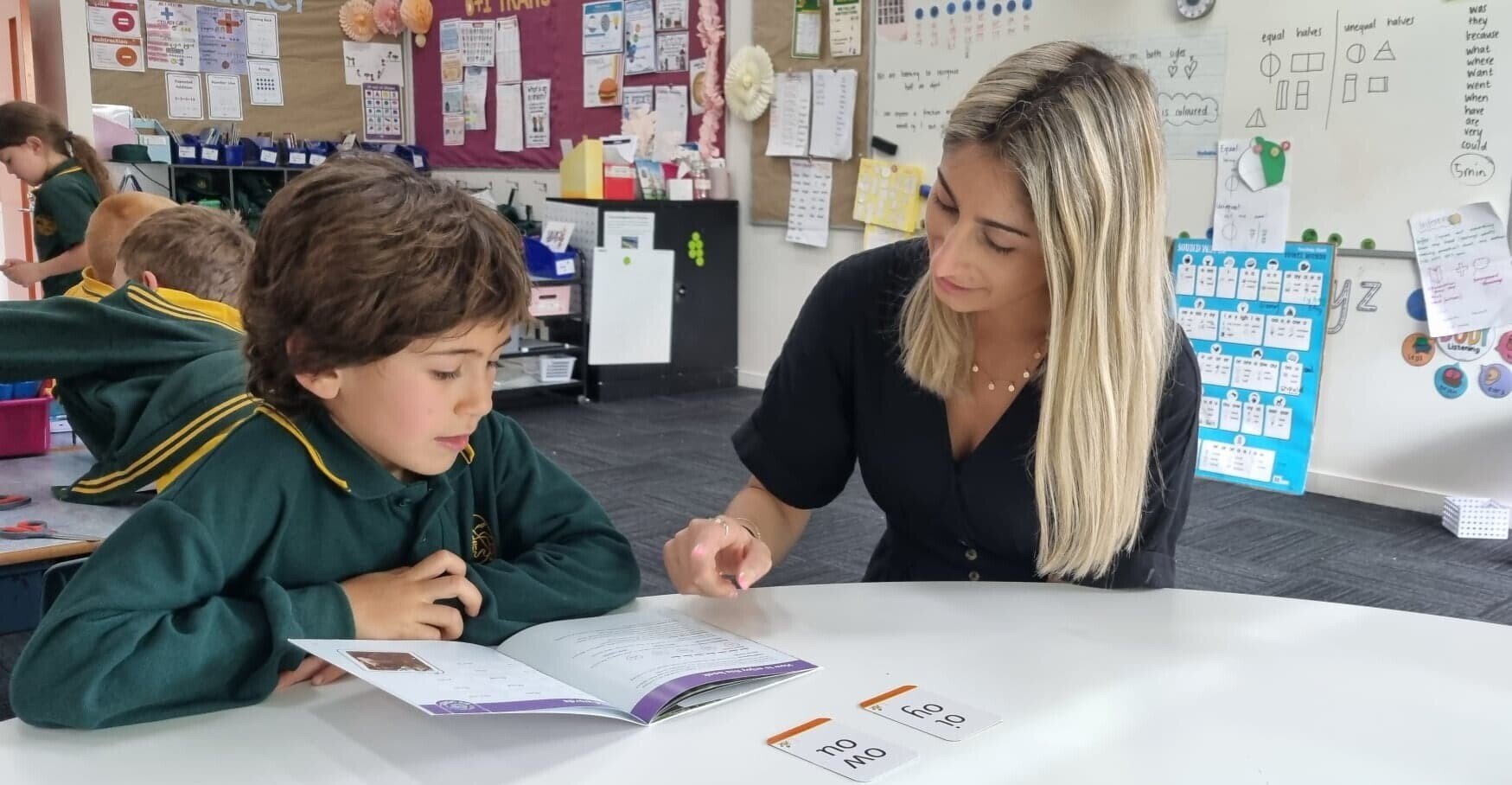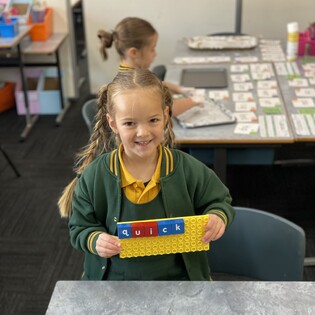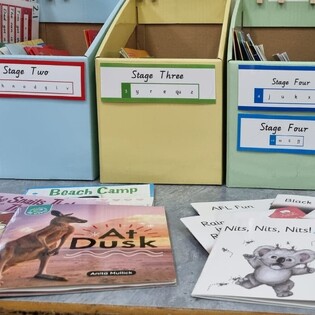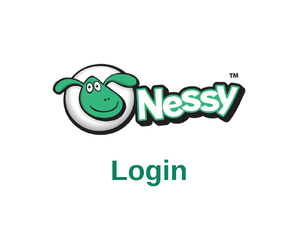At Dromana Primary School we understand how vital literacy skills are to support all learning
We use evidence based methods to ensure all students succeed and thrive in this area.
Learning to read is not a natural process like learning to walk. Our brains are naturally wired for oral language (speech); however, our brains are not naturally wired to read and write. Reading is a complex skill and what is termed biologically secondary. While some children seem to effortlessly begin reading, the majority of people need to be taught. The written code has not been around for long enough for humans to have developed a ‘reading brain’. The past three decades have produced exciting evidence about what happens in the brain during reading and what needs to take place instructionally in order to wire the brain to be able to read.
At Dromana Primary School we understand the way in which the brain learns to read and this informs the way we are teaching reading and writing
Our evidence based approach is informed by a body of research called ‘The science of Reading’ ensuring all children develop literacy skills for future academic success.
In the junior years we focus heavily on ‘learning to read’ with fluency and in the senior years we shift to a focus on ‘reading to learn’ with strong comprehension and understanding. We offer a Literacy Program that uses explicit and systematic teaching of fundamental knowledge and skills, where we explicitly teach children how to decode (read) and encode (spell) using an evidence based approach that ensures that all children develop the Literacy skills needed for future academic success.
All components of the ‘Literacy Big 6’ are integrated and embedded into our comprehensive Literacy program. Our structured literacy approach engages students in each of these essential aspects of literacy on a daily basis.
‘Literacy Big 6’
- Oral Language
- Phonological Awareness
- Phonics
- Vocabulary
- Fluency
- Comprehension
A daily Literacy block at Dromana Primary includes:
Explicit teaching of phonological awareness and phonics Little Learners Love Literacy in Foundation and Year One, Soundwaves from Years two through to Year six.
- Automaticity training in the recognition of high frequency words. We use grapheme/phoneme mapping practices to promote orthographic mapping.
- Guided fluency practice
- Vocabulary development – this includes morphology and etymology.
- Explicit teaching of Comprehension strategies
- Use of rich authentic texts in reading and writing lessons to build reading comprehension, model reading behaviours and teach various aspects of writing.
- Use of reader’s and writers note-books.
Our Foundation to Year two classrooms incorporate daily phonological and phonemic awareness into their Literacy block. We follow the Little Learners Love Literacy Systematic Phonics Program in Foundation, Year One and the beginning of Year Two.
This teaches children the 44 sounds of our language and how we blend sounds to read and segment sounds to spell. We have invested in decodable books for school and home in our junior classrooms so that children can practice the decoding skills they are taught in phonics lessons. All students have their own book boxes and they read from these each day during Reader’s Workshop sessions where they are able to practice reading books that are at their independent reading level.
Decoding
Students are provided with decodable books until they are able to decode most sounds in our language with fluency. Once decoding skills are automatic, students are able to choose from a wide range of texts available in the classroom. While students are learning the code, teachers share rich, authentic texts daily with students during the Reader’s Workshop mini-lesson and these are used as mentor texts to model reading behaviours and comprehension strategies. The Reader’s Workshop Model provides a structure for reading lessons from Foundation through to Year Six and this follows the gradual release of responsibility frame-work to facilitate whole class explicit teaching, small group work, independent work and has children thinking deeply about the texts they read. In Years three to six, the focus shifts from phonological awareness and phonics to spelling, morphology and etymology.
Our classrooms are equipped with classroom libraries in order to foster a love of reading and ensures that our students have access to literature at all times. We have a reading centre where students can borrow books to take home or keep in their book boxes on a fortnightly bases.
Students in Foundation to Year Three each have a Nessy account. Nessy follows a structured, sequential, systematic synthetic phonics approach that progresses to fluency. It includes the important aspects of phonological processing, sound-letter correspondences, decoding, encoding, synthesising, spelling, orthographic mapping, morphology and it does this through a game based approach. Students in Years Four to Six each have a Lexile account and enables students to choose books matched to their reading ability, grade level or interests among the hundreds of thousands of books. This also helps children build vocabulary knowledge and reading comprehension.
Writing at Dromana Primary
In writing, we draw on the Writing Revolution methods to explicitly teach an evidenced based set of writing strategies that teachers can use in every grade in all writing genre’s.
This method enables students to master the skills that are essential if they are to become competent writers. In turn, those skills equip students to become better readers, to communicate more effectively in writing and speaking, and most importantly, to elevate their thinking.
A Writer’s Workshop Model is used from Foundation to Year Six and this helps to motivate our students to write for a key purpose and audience. We use mentor texts within our Writer’s Workshop sessions to expose students to various authors craft and to experience high quality Literature. We also use these mentor texts to teach the 6+1 Traits of Writing and our students practice using these traits within their own writing. The Six Traits of writing are evidence based and the research concludes that all good writing has 6 important traits - Voice, Ideas, Presentation, Conventions, Organization, Word Choice, and Sentence Fluency. The Traits provide us with a common vocabulary across the school and guides teachers in their planning to enable all our students to become competent writers. Our students are familiar with the terms used in writing and there is consistency across the whole school.
Collaborative Planning
Our lessons are collaboratively planned within teams of teachers working together to design and implement learning opportunities based on current data that pinpoints the learning needs of every child. Within Reading and Writing Workshops, students are supported in conferencing for areas of need and teachers work closely with their students on their individual goals so that they can have agency in their learning and they know and understand where they are at and where to next in their learning.
















